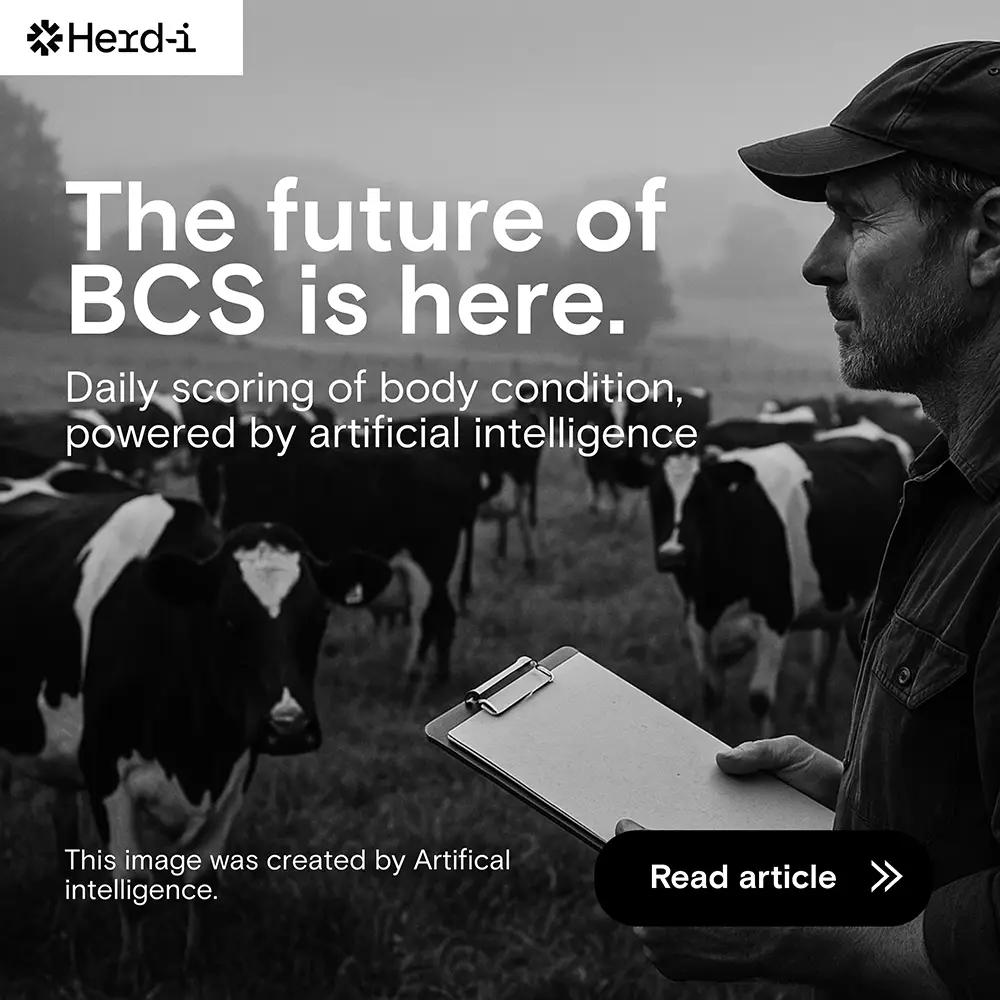This month, 42 selected dairy farmers are the first in New Zealand to go live with Herd-i’s innovative AI-powered Body Condition Scoring (BCS) system.
These early adopters are integrating this new AI technology into their dairy sheds to monitor cow health year-round with near real-time, daily body condition scores. Farm sizes of the first 42 operations range from 263- to 1972-cow herds.
Traditionally, dairy farmers rely on manual body condition assessments, which can be inconsistent, time-consuming, and typically done only a few times a year. Herd-i’s AI-powered system eliminates these challenges by providing consistent, daily body condition scores, enabling farmers to monitor trends in their cows’ conditions year-round.
Amanda and Dean Benson, who own and – together with second-in-charge, Josh – manage a 250-cow dairy farm in South Waikato, are the very first of Herd-i’s group of 100 BCS launch farmers to have the technology installed during May.
For Amanda, the decision to adopt Herd-i’s system was all about gaining consistent data and being able to make fast, informed animal health decisions.
“When we learned about Herd-i’s BCS system, it didn’t take much to convince us to integrate it into our operation. We were already familiar with how manual body condition scoring works, and we knew the inconsistencies we faced using this method.
“With Herd-i, we’ll have daily data, which means we can make quick, proactive and informed decisions, not just react when a cow is clearly in a poor state,” she says. “Herd-i will allow us to monitor every cow’s trend, address health issues before they become severe, and improve the overall health and productivity of our herd.”
Daily data, time savings, and financial benefits
One of the biggest challenges farmers face is that conventional body condition scoring provides point-in-time data only.
According to Marty Orange, Herd-i’s Sales Manager, “Herd-i provides farmers with daily body condition data which is presented as rolling average trends. This allows farmers to more closely monitor small changes in the body condition of their herd.
“These small changes in individual cows include data that shows the cow is losing or gaining body condition at a different rate to the rest of the herd. Getting this data in near real-time allows farmers to more quickly adjust their farming practices when required.”
The system also saves farmers significant time by automating the scoring process. Instead of spending hours manually scoring the herd, farmers can rely on the system to automatically track body condition scores and receive alerts if any cow’s condition changes.
Herd-i also drives financial savings by helping farmers optimise feed use and reduce waste, which directly impacts profitability. Marty explains, “Optimising feed use means farmers can save money by reducing waste and lowering feed costs, especially important as feed prices fluctuate.”
Amanda adds, “With Herd-i, we can be more proactive with feeding decisions. We are no longer at risk of overfeeding cows that don’t need the extra supplementation. It’s all about balancing animal welfare with financial sustainability. Herd-i adds to our existing tools to help us do that.”
Independent certification
Herd-i’s AI-powered Body Condition Scoring system has been trained by certified Gold Standard BCS calibration assessors using real-world, on-farm data.
“We’ve invested a lot in the development of this system to ensure that the data used to train the machine learning model is as accurate as possible,” says Dr Bin Wang, Herd-i’s Head of Machine Learning.
“The machine learning model that powers Herd-i’s body condition scoring was trained using over one million video images of cows and more than 40,000 real-world body condition scores collected from farms,” adds Dr Wang.
The Herd-i BCS system is trained using DairyNZ’s industry-standard body condition scoring scale. This ensures the system meets the same high standards farmers are used to, while also offering more data-driven insights.
Over time, the BCS scoring model continues to be trained and further optimised. “The performance of the model will improve as we continue to train the model using data that captures the changes in body condition which occur on farm over an entire season, across a range of farm system types and cow breeds,” states Dr Wang.
Continuous improvement and the future of Herd-i
As more farmers adopt Herd-i’s BCS system, the company continues to gather feedback from users, which in turn is fed into the system’s development. This collaboration and iterative development process helps ensure that the technology adapts to real-world farming conditions and continues to evolve based on user experiences.
Amanda looks forward to the ongoing evolution of the system. “As we continue to use Herd-i, I’m excited to see how the system evolves with us. It’s a tool that will only get better with time, and that’s exactly what we need to stay ahead in farming,” she says.
Herd-i’s BCS system represents the future of data-driven farm management.
“This technology is a game-changer,” says Marty. “It helps farmers manage their herds more effectively, boost productivity, and make decisions that support the future of their farms. By combining trusted industry standards with cutting-edge AI and working together with our customers, we’re giving farmers the tools to succeed.”
-ends-
Media contact:
Liz Muller, Herd-i CEO
Liz.muller@herd-i.com, 029 221 1550

